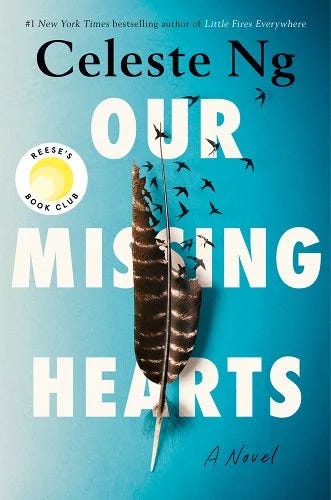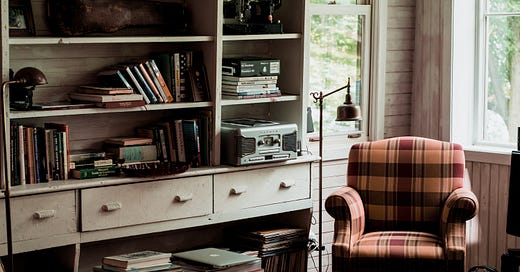
My new house is an old house. That is, it was built sometime around 1977, which is actually not very old at all or absolutely ancient, depending on which of its inhabitants you ask.
It’s not much to look at, from the outside—just your basic two-storey semi, with cream-coloured siding above red brick and a long, narrow driveway running up to a comically small garage. It is, the sort of place that, as Nancy Mitford would put it, was designed “neither in good taste nor in bad taste, but simply with no attempt at taste at all.” And yet, it’s got it—that warm, inviting quality that distinguishes a home from a house. It has almost nothing to do with the size or style of a dwelling. Some downright ugly places have it, and some stunningly gorgeous ones don’t. That’s just the way it is.
The people who owned this home before me lived here for four decades. They decorated it in the early 1980s, and then spent the 90s, or possibly the aughts, slowly customizing it according to their needs and priorities—a new kitchen with a truly massive pantry, a workshop in the basement, an above-ground pool out back. They did a lot of the work themselves, and definitely didn’t waste time on keeping up with home decor trends, or the Joneses, after these big projects were done. They just loved their house and looked after it well, right up until a few years ago, when it finally became evident that they just couldn’t, anymore, but couldn’t bear to leave, either.
It’s not the house I envisioned, when I decided to move. It’s probably not even the house I would have chosen, had there been any others to choose from when we were looking. But there weren’t. Not a single one I could seriously consider, in the (admittedly small) neighbourhood I was set on. The lack of other options made this place feel fated, chosen for me rather than by me, and it wasn’t an entirely unpleasant feeling.
People keep asking me if we’re “settling in,” and technically, the answer is yes, in that I’m no longer surrounded by boxes, or being driven mad by construction noise, or awaiting the delivery of my fridge and stove. I can get to the mall and the grocery store without a gps. We have a dentist and library cards. The kids are in school, and are forming friendships.
But this house doesn’t feel like home yet, and I’m not sure when it will. I suspect it will sneak up on me, like the growth of my children. I won’t see or feel it as it is happening, but one of these days I’ll look up from some mundane task and realize that it has, incontrovertibly, happened.
As I wait, hopefully, for that moment to arrive, I’ve been repeating that Richard Francis Burton quote to myself over and over: “home is where the books are. “
I radically downsized my personal library before the move, caught up in the impracticality of paying to move books I would probably never read again. When I unpacked the boxes, I was shocked to discover that all I had kept was barely enough to fill one bookcase. And while I haven’t missed any of the specific titles I left behind, I find myself missing their collective presence. There’s a three-shelf case in my office that is entirely empty, and it’s depressing.
The absolute best thing about this new-to-me house, though, is that it’s about fifteen minutes on foot from an awesome used bookstore. Slowly but surely, this bookcase is going to be filled. One day I’ll find myself wandering from room to room with a book in my hand and thinking I really need to buy another bookshelf, and maybe that will be the day this place finally feels like home.

The first book I bought after moving in, Our Missing Hearts by Celeste Ng, is a dystopian coming-of-age story set in the States not long after the Crisis, a prolonged economic downturn that results in idle factories, shortages of basic necessities, riots, looting, illness, violence, and, finally, the formation of PACT (the Preserving of American Culture and Traditions Act).
Through the story of one boy’s search for his missing mother, and his mother’s search for hundreds of missing children, Ng explores the deeply human need to truly belong somewhere, and the horror of being cast out, of being told you don’t belong in the only country you have ever known.
In the novel, the process of separating a child from an ‘unAmerican’ family is called ‘re-placement,’ and that little hyphen poked at me, every time I read it. It’s jarring, that little break in a word we usually see as one smooth, unbroken glide from the beginning to the end. It breaks the word in two and then holds them together a bit awkwardly, like a broken pair of glasses repaired with scotch tape.
The hyphenated version is a better reflection, I think, of what it’s really like to pluck someone out of one place and set them back down in another, even if you sincerely believe it’s the right thing to do, or that they will be better off in the new place. Maybe they will be. But they'll never be the same.
It’s not an easy-breezy read, emotionally—I suspect that
would give it a 3/5 on her Gentle Lamb Scale—but this is Celeste Ng we’re talking about, so it’s also a joy to read, in that her writing is so evocative. I don’t always visualize what I read, but I did, with this book. If this excerpt doesn’t come to life in your mind, I don’t know what will:On their old street, each house is a different drab shade: tan, dirty cream, the washed-out gray of tattered laundry: as if all the color has leached away since his childhood. Slope shouldered, listing slightly to one side, they resemble old ladies, their clothing grown shabby and loose. There are garbage cans stowed behind fences, here and there a soggy newspaper, still in its plastic sheath, on the sidewalk—but it’s quiet. And then there it is again: their house, just as it has always been. Dusty green, like the underside of a leaf.
I hope you’ll give it a try.
One last thing, before I sign off and go to the hardware store for the gazillionth time since I moved into this old money-pit: I reviewed the Apple TV+ adaptation of Lessons in Chemistry for LitHub.
Are you watching it too? Loving it? Hating it? Did you read the book first and if so, are you as ticked off as I am by what they did with Fran? As conflicted as I am about the new-and-improved Harriet? Do tell.




I’m with you on the hunger for filled-up book shelves! They don’t need to be overflowing. Packed solid is ok but doesn’t leave room for expansion. But a shelf without books is, indeed, a sad sight! I suppose I’m making an argument for the Goldilocks approach. The number of books, for each of us, needs to be “just right.”
See you Dec 6! Looking forward to it.
I am currently living out of boxes, and I cannot wait until I have a home full of my books again. I move in later in November, and I truly know the feeling of home is where the books are, and I cannot wait to be settled again! I hope your home feels it soon :)